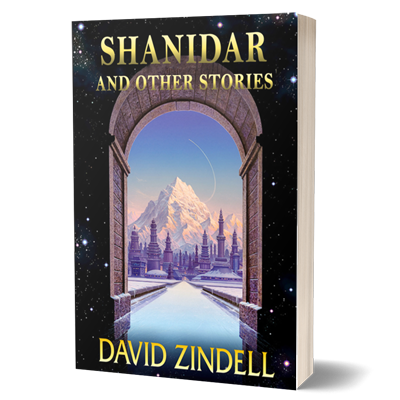David Zindell’s first novel, Neverness, is set in the same future as his compelling story “Shanidar,” which was the standout of the first Writers of the Future anthology. But the novel bears the same relation to the novelet that a ten-lane interstate bears to a country road.
This is, at first glance, a spaceopera future, set in a city without telephones, where the major mode of land transportation is ice skates, while members of the Pilots' Guild pop in and out of windows in the manifold, finding intricate pathways between stars. In true Romantic fashion the pilots embark on quests, answering the call of the Timekeeper. In five hundred or so pages we live through rivalry between father and son, incest, intrigue, murder, resurrection, unmasking, and conversations between gods who once were human and humans who will soon be gods. There is a starfaring race that goes about devouring stars, and another that left a vital message for mankind before going off to live in a black hole. I can't remember reading a better Romance in all of science fiction.
But Zindell doesn't do just one thing. This novel does everything. These are not the onedimensional role-fillers that are usually all that Romance requires. They change and grow, they become real. The grand events unfold through their utterly believable behavior in a fully-invented milieu
It is also excellent hard science fiction, with serious treatment of difficult mathematical and genetic questions. Have you wondered what all the "extra" or "junk" genes in our DNA are for? Can space be folded so that every star is near every other star? Pilots meld with their ship’s computers and then maneuver through the stars by constructing mathematical proofs that the movement they need to make is possible.
Ideas splash out of Zindell's mind and flow across the pages of this book – yet the action doesn't stop for them. Rather the ideas pick up the story and sweep it along. Ultimately, the story is about the search for the meaning, the purpose, the secret of life. Zindell has the audacity to answer that great question. And it is in his daring to answer it that this book becomes, not just a brilliant novel, but a strong and serious view of human potential.
There are obvious echoes of Gene Wolfe in Neverness. Zindell has picked up some of Wolfe's stylistic quirks - lists of arcane and archaic words, for instance (“eschatologists, cetics, akashics, horologes ... scryers, holists, historians, remembrancers, ecologists, programmers, neologicians, and cantors”) – all of which are used in the story; Zindell does not list in vain). It is daring to invite comparison with Wolfe,. and sometimes a bit embarrassing. For instance, when Zindell lists all the different kinds of bars in one district of the city Neverness, he ends the list by saying, "Somewhere – and why not? – there is a bar for those wishing to talk about what is occurring in all the other bars.” Such anti-climax – such an obvious punchline. Wolfe could surely have done a double-twist, like “A bar for those who believe there are no bars, and another for those who believe there are bars, but don't believe anyone has ever seen one.”
But that is early in the book. Zindell soon becomes himself strongly enough that the reader no longer compares him with Wolfe or anyone else. Or rather, while I recognized that Zindell could not match Wolfe at Wolfe's best games, he had some strengths Wolfe doesn't have - for instance, Zindell's individual episodes, powerful as they are, never obscure the main thread of the story, and while his narrator is self-conscious, he remains fundamentally innocent. He remains so that the narrative is always vigorous, and the narrator doesn't surprise us so much as he joins us in being surprised all over again by what happens in the tale.
Like all the best science fiction writers, Zindell came up with concepts and cultural patterns that required the coinage of words. Cark: To alter a human structure at a genetic level, so you permanently change the physical form. SIe1: To take DNA from someone against his will, to create avatars of him, or perhaps children. Fenester: To pass through “window”after “window”in the manifold – a verb that science fiction has long needed. Zindell has helped develop our collective language, which is a model of our collective mind.
I wish I had written this book. Not because I admire it (though obviously I do). My feelings are beyond mere jealousy. I wish I had written it because as I read it I heard Zindell say things I had tried to say in many of my own works, but never did, not this clearly, not this fully. I wish I had written it because it is the truth, earned truth, truth that flows out of a story that is at once grand and small, brilliant and dark, simple and intricate. I wish I had written it because a storyteller never truly knows a story until he has told it. I have read Zindell’s book, and I want to knoww hat he knew that allowed him to tell this tale. I want to tell it myself someday.

